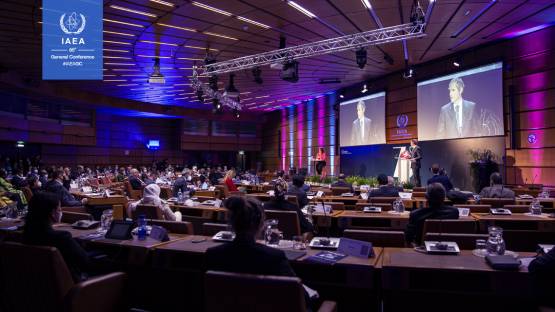During lockdowns caused by COVID-19 that began in March 2020, the Joint FAO/IAEA Centre of Nuclear Techniques in Food and Agriculture guided countries on the detection of the virus causing COVID-19, through its Veterinary Diagnostic Laboratory Network (VETLAB). VETLAB has helped over 60 countries detect and control animal and zoonotic diseases, including COVID-19. This progress will continue with IAEA’s Zoonotic Disease Integrated Action (ZODIAC) initiative, launched last year.
Mr Dongyu, noted that the “FAO has been working closely with the IAEA since 1964 to contribute to sustainable food security and safety by using nuclear techniques and biotechnology. Through our joint multi-disciplinary laboratories, and close collaboration with other organisations such as the OIE, we have been collaborating to develop technologies and applications in animal disease diagnosis.”
The IAEA, as a member of the United Nations Crisis Management Team for COVID-19 and in coordination with WHO, provided assistance to 129 countries through the provision of equipment to detect COVID-19 and support training—the largest Agency technical cooperation project ever.
Mr Ghebreyesus added that the “WHO recognises the contribution of the IAEA in improving global veterinary lab capacity to strengthening health systems and pandemic preparedness and response globally. This complements the frameworks and mechanisms put in place by WHO as well as our partners.”
Ms Eloit of OIE noted that “as the world’s population continues to grow and compete for diminishing resources, we are reminded more than ever that the health of humans, animals and other organisms is of importance. Collectively we need to be more intelligent and adapt system syncing in our work. One Health describes a multisectoral approach to health of animals, humans and other organisms.”
A leading expert in infectious diseases, Director of the African Centre of Excellence for Genomics of Infectious Diseases (ACEGID), Christian Happi, discussed the case of Ebola in Nigeria, where they could overcome the disease in record time and show how the world can learn lessons from this. “By the time we detect and categorise an emerging pathogen, it’s often too late. But we’re in a cusp of a new era, we can change it. We heard the IAEA Director General talking about ZODIAC, it is one of those initiatives, building on knowledge, technology, capacity building, training with which we can overcome threats.”
Keynote speaker and UN Messenger of Peace, Jane Goodall, explained how zoonotic diseases occur through the human treatment of animals and the movement of their pathogens: “If one of these pathogens such as a bacteria or virus jumps into a human, then it may cause one of these new zoonotic diseases.” She continued to state: “It’s become very clear that human health and well-being is closely linked with the health of the environment which in turn, depends on the health of the animals and plants that make up the biodiversity of an area and ecosystem. We’ve got a window of time where we can try and turn things around, but I don’t think it’s a very big window and it’s closing…we must take action, together, and we must take action, now.”
“In the context of recurring health emergencies, almost always linked to infectious diseases, often of zoonotic origin, it is important to begin to examine and raise awareness of the role that can be played by science in general, and nuclear science in particular, in preparing for and responding to these public health threats,” said Khalid Ait Taleb, Minister of Health of Morocco.
Deputy Minister of Agriculture and Rural Development of Albania, Ermira Gjeci, shared her country’s experience: “Nuclear and similar technologies have played an important role in animal health, especially in relation to the diagnosis of diseases and the characterisation of pathogenic organisms. In Albania, from May 1 to August 15, 2021, we had outbreaks of bird flu in domestic birds and wild birds.” She added that the use of molecular biology methods made obtaining the results in 24 hours possible in order to ensure that we take immediate measures.
Honduras, too, has suffered from animal and zoonotic diseases and has successfully applied nuclear techniques to control them, said Karen Najarro, Vice Minister of Foreign Affairs of Honduras.
“In recent years, our country has suffered from various zoonotic diseases, such as dengue, Zika and Chikungunya, transmitted by the Aedes aegypti mosquito. We believe the international community must be able to tackle such emergencies. The IAEA has been a strategic partner in this fight. This pandemic has shown that lower middle-income countries like Honduras need international assistance to face these challenges. ZODIAC, through its five pillars, will clearly be central to helping Member States improve and implement new diagnostic methods.”
Amadou Alpha Sall, Director of the Dakar Pasteur Institute in Senegal summed up the need for three steps in tackling zoonotic disease outbreaks:
- to build a global surveillance system based on technologies focused on local competence,
- to detect zoonoses early in order to report them and develop tools to trace them, such as real-time PCR and rapid tests, and
- to talk to the community and learn from them about their needs.
The discussion continues in five sessions during the two-day programme.




